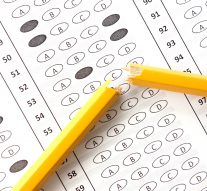
Standardized Tests are Inaccurate
Lifestyle & Opinion February 11, 2017By Sofia Ershova
“If my future were determined just by my performance on a standardized test, I wouldn’t be here. I can guarantee you that.” This is something the First Lady of the United States of America said. Michelle Obama is one of the most intelligent and successful women in the world, and she did not do well on standardized tests. The above statement furthermore supports the idea that standardized tests do not accurately measure a student’s intelligence and performance. There are many factors that can impact a student’s test score negatively, including stress, lack of language skills, and lack of special needs accommodations. Additionally, standardized tests do not test every field of education, making them all the more inaccurate.
A Brookings Institution study found that “50-80% of year-over-year test score improvements were temporary.” Leading up to standardized tests, teachers overwhelm their students with information to study that will appear on the test. Students typically end up binge studying, and not retaining most of the information. If a student were given a standardized test one week after binge studying for one night, their scores would be significantly lower as they did not retain what they learned. Furthermore, most students understand that they can rarely apply knowledge they learned for the test to real life scenarios, making them even less eager to make the information stick.
Many factors can lead to a drop in test scores, the largest factor usually being stress. Just the mere thought of taking an exam that could make or break a person’s education for the next year stresses a student out. Students understand that if they do not achieve an above average score, they could lose their spot in honors courses, and be placed into regular or even remedial classes. When a student is under severe and chronic stress, they cannot perform their best. Standardized tests bring out anxiety in even the top students of the class. The Sacramento Bee has informed “The Stanford-9 exam comes with instructions on what to do with a test booklet in case a student vomits on it.” How accurate could a test be if it makes a student so nervous that they vomit?
Standardized tests are discriminating against non-English speakers. Every student in the class must take the same exam, no matter their language skills. An exchange student or a recent immigrant may be extremely bright with excellent grades, but their standardized test scores would not display that. Due to a student’s lack of English skills, a standardized test would portray them as below average, impacting their future education. Standardized tests cannot measure intelligence effectively if the student does not understand questions because of a language barrier.
Similarly, discrimination against special needs students is present in standardized tests. While special needs students might get additional time on the exam, the questions stay the same. Students with mental disabilities cannot always comprehend things the same as the other students, therefore a special needs student might not understand questions that other students would. A test made for the standard student will not accurately show the intelligence of a special needs student.
Countless students excel in art, music, foreign languages, and have many other skills that are not present on standardized tests. An exam cannot correctly measure a student’s intelligence by only testing certain parts of their education. A student who has a weak spot in science and math, but excels in many other subjects, will receive below-average scores and be perceived as below-standard, while truly being exceptionally bright.
Every student is an individual, with his or her own talents and skills. For this reason, not all students excel in the same subject. Every student is unique, and cannot be treated as a whole. A standardized test made for a standard student cannot accurately determine the intelligence and performance of an individual.



